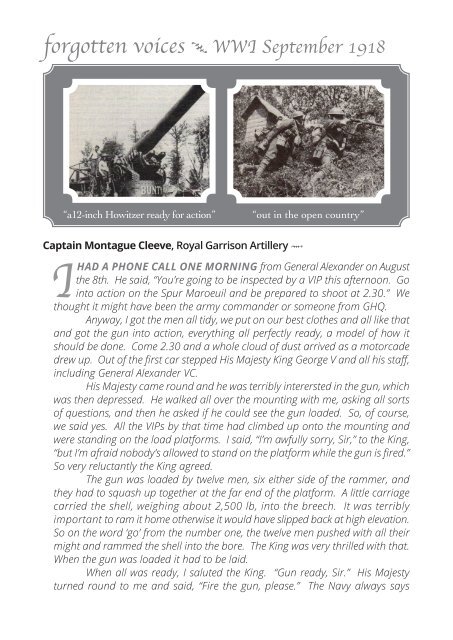St Mary Redcliffe Church Parish Magazine - September 2018
- No tags were found...
You also want an ePaper? Increase the reach of your titles
YUMPU automatically turns print PDFs into web optimized ePapers that Google loves.
forgotten voices WWI <strong>September</strong> 1918<br />
“a12-inch Howitzer ready for action”<br />
Captain Montague Cleeve, Royal Garrison Artillery <br />
“out in the open country”<br />
IHAD A PHONE CALL ONE MORNING from General Alexander on August<br />
the 8th. He said, “You’re going to be inspected by a VIP this afternoon. Go<br />
into action on the Spur Maroeuil and be prepared to shoot at 2.30.” We<br />
thought it might have been the army commander or someone from GHQ.<br />
Anyway, I got the men all tidy, we put on our best clothes and all like that<br />
and got the gun into action, everything all perfectly ready, a model of how it<br />
should be done. Come 2.30 and a whole cloud of dust arrived as a motorcade<br />
drew up. Out of the first car stepped His Majesty King George V and all his staff,<br />
including General Alexander VC.<br />
His Majesty came round and he was terribly interersted in the gun, which<br />
was then depressed. He walked all over the mounting with me, asking all sorts<br />
of questions, and then he asked if he could see the gun loaded. So, of course,<br />
we said yes. All the VIPs by that time had climbed up onto the mounting and<br />
were standing on the load platforms. I said, “I’m awfully sorry, Sir,” to the King,<br />
“but I’m afraid nobody’s allowed to stand on the platform while the gun is fired.”<br />
So very reluctantly the King agreed.<br />
The gun was loaded by twelve men, six either side of the rammer, and<br />
they had to squash up together at the far end of the platform. A little carriage<br />
carried the shell, weighing about 2,500 lb, into the breech. It was terribly<br />
important to ram it home otherwise it would have slipped back at high elevation.<br />
So on the word ‘go’ from the number one, the twelve men pushed with all their<br />
might and rammed the shell into the bore. The King was very thrilled with that.<br />
When the gun was loaded it had to be laid.<br />
When all was ready, I saluted the King. “Gun ready, Sir.” His Majesty<br />
turned round to me and said, “Fire the gun, please.” The Navy always says<br />
please, so I immediately ordered fire. Many of his surrounding staff cupped<br />
their ears and turned away from the gun because they were frightened of the<br />
shock. His Majesty stood as still as a statue and seeing all these cowed heads<br />
turned round and said in quite a loud voice, “I consider it makes no noise at all,<br />
no noise at all.” His staff all looked awfully sheepish after that. But it did make<br />
an enormous bang. It was a gentle bang, but a very gigantic one.<br />
The King then said, “May I look at the map?” So we took him into the<br />
command post wagon and he pored over the railway map of the front line. He<br />
turned round to his staff and he said, “You know, gentlemen, I’ve just come from<br />
the launch of the Fourth Army attack at Amiens, down south. I see from the railway<br />
system that the Germans will have to rush there with their reinforcements,<br />
now at Ypres, to resist the attack of the Fourth Army. And I see from the railway<br />
line system that they’ll have to go through Douai station to get there. Why not<br />
keep Douai station under harassing fire from now on?”<br />
Later I went into Douai and spoke to a local woman. She said, “Well<br />
really, Douai was a very peaceful place until early in August. Then all of a<br />
sudden one afternoon there was a terrific explosion in the station and nobody<br />
knew what it was. We thought we were being bombed. Well, it so happened<br />
that there was a German troop train in the station at the time and a shell fell<br />
right on top of it. The people of Douai were delighted.” That first round, the first<br />
of anything that happened at Douai, was the King’s shot. So his idea worked<br />
extremely well, but unfortunately he never knew about it.<br />
Sergeant-Major Richard Tobin, Hood Battalion, Royal Naval Division <br />
I<br />
N THE SUMMER OF 1918 came the<br />
breakthrough. We had left the trenches<br />
far behind, those mud-sodden trenches<br />
that we had hated for so many years.<br />
We were out in the open country. We<br />
almost felt victory in the air. Admittedly<br />
the Germans were standing and fighting<br />
here and there, but they were going back<br />
and we were following them. The breakthrough<br />
had come. It was open warfare.<br />
We were in green fields once again.<br />
However, open warfare brought its difficulties. This was the test of a trained<br />
soldier and junior officer leadership. The battalion commander had to watch<br />
his flanks, wondering when to stop, when to dig in, when to go on We also had<br />
our ration problems. But it looked like the end and the peace we had longed for.<br />
Voices compiled by Lester Clements, for <strong>September</strong> 2108


















